Alexandria’s African-American community has long been at the forefront of the fight for freedom and equality. From courageous abolitionists to historic landmarks, this city’s residents have left an indelible mark on the struggle against oppression. While the Civil War disrupted their activism, the community’s religious convictions sustained their efforts. Today, preserving this rich heritage remains a priority, offering a window into the profound legacy of Alexandria’s freedom fighters. Their story is one of resilience, sacrifice, and an unwavering commitment to realizing the promise of liberty – a testament to the power of perseverance in the face of adversity.
Key Points
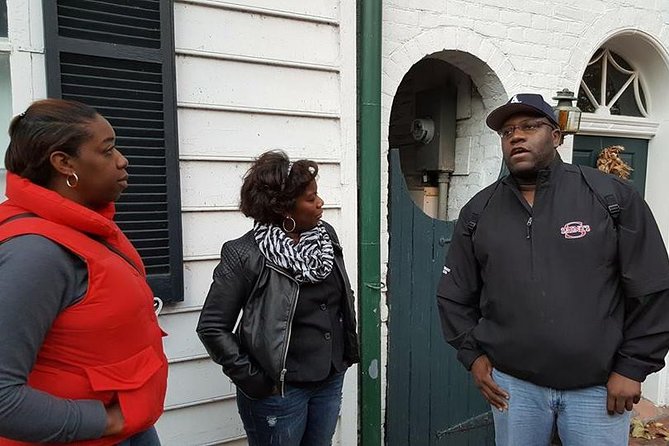
-
Alexandria’s African-American community played a pivotal role in the fight for freedom, with prominent abolitionists and historic landmarks of resistance.
-
Gadsby’s Tavern served as an important gathering place for abolitionist figures, symbolizing the community’s commitment to ending slavery.
-
Religion provided critical spaces and moral leadership for organizing and activism against slavery, inspiring hope and resilience in long-term movements.
-
The Civil War period disrupted the status quo, leading to the emancipation of enslaved individuals and creating new social and economic opportunities.
-
Passionate local historians and organizations work to preserve and share the rich heritage and legacies of Alexandria’s Black community.
Enslaved Individuals in Alexandria
Enslaved individuals were a significant part of Alexandria’s history, with many serving in roles across the city’s businesses and households. They worked as tavern staff, domestic servants, and laborers, often living in the shadows of their white counterparts.
These enslaved people faced immense hardship and oppression, denied the basic freedoms that others enjoyed. Yet, some found ways to resist and assert their humanity, such as the enslaved man named William Goodwin, who sued for his freedom in the 1790s.
Alexandria’s African-American heritage is a complex and often overlooked aspect of the city’s past, one that this tour aims to shed light on and honor.
You can also read our reviews of more tours and experiences in Virginia.
Prominent African-American Abolitionists
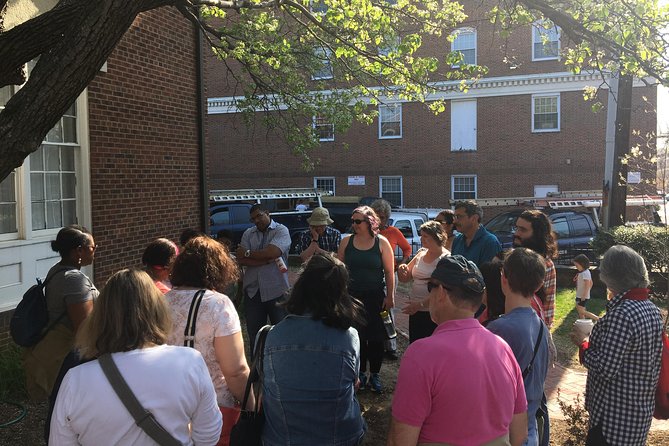
While the stories of enslaved individuals in Alexandria shed light on the struggles faced by the African-American community, the city also witnessed the courageous efforts of prominent abolitionists who fought to end the institution of slavery.
One such figure was Benjamin Thornton Wells, a free Black man who co-founded the American Anti-Slavery Society in 1833 and worked tirelessly to advocate for the emancipation of enslaved people.
Another notable abolitionist was Lucy Goode Brooks, a former slave who established one of the first schools for African-American children in Alexandria and became a vocal advocate for educational opportunities.
These brave individuals played a pivotal role in shaping the city’s fight for freedom and equality.
Historic Landmarks of Resistance
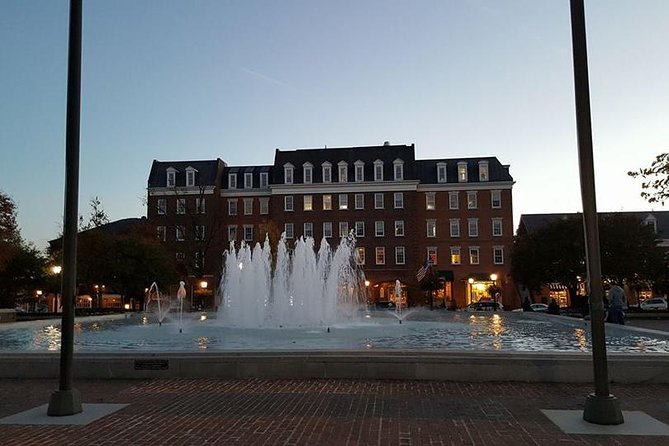
Alexandria’s rich African-American heritage is embodied in its historic sites of resistance, serving as reminders of the steadfast struggle for freedom.
One such landmark is the Contraband Historic Site, where thousands of enslaved people sought refuge during the Civil War. Here, they built a thriving community and demanded their right to liberty.
Another is the Robert H. Smith Center for the Constitution, housed in the former home of an anti-slavery activist. This site highlights the role of African-Americans in shaping the nation’s founding ideals.
These landmarks bear witness to the courage and resilience of Alexandria’s Black community, who fought tirelessly to make the promise of freedom a reality.
Significance of Gadsby’s Tavern
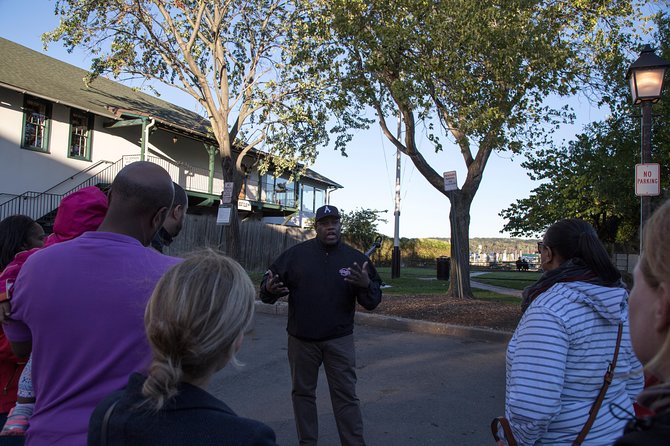
One of the most significant landmarks in Alexandria’s African-American history is Gadsby’s Tavern, which served as a hub for political and social activity during the 18th and 19th centuries. Formerly a gathering place for the city’s elite, Gadsby’s also hosted important figures in the abolitionist movement, including Frederick Douglass and William Lloyd Garrison. The tavern’s significance lies in its role as a meeting place for those fighting for freedom and equality.
| Significance of Gadsby’s Tavern |
|---|
| Political & Social Hub |
| Abolitionist Gathering Place |
| Symbol of Resistance |
The tavern’s legacy as a symbol of resistance and a catalyst for change in Alexandria’s African-American community endures to this day.
Exploring Market Square’s Legacy
Another historic landmark central to Alexandria’s African-American heritage is Market Square, which served as a bustling center of commerce and community for centuries.
Situated in the heart of Old Town, the square was once home to an open-air market where enslaved and free Black residents sold their wares. It also hosted public executions, including those of formerly enslaved individuals accused of crimes.
Today, the square is a vibrant public space, hosting community events and farmers markets that celebrate the area’s rich history. Visitors can explore the site’s past by visiting the Alexandria Black History Museum, which offers insights into the experiences of African-Americans in the region.
- Luxury Tours of Mount Vernon
- Private Customized Tour of Washington DC With US Veteran
- Visit Mount Vernon by Bike: Self-Guided Ride With Optional Boat Cruise Return
- Kayak Tour Along Assateague & Chincoteague Island, Virginia
- Escape Room Live Alexandria: 60-Minute Adventures
- Small-Group Sunset Boat Tour Around Chincoteague & Assateague Islands
Role of Religion in Activism
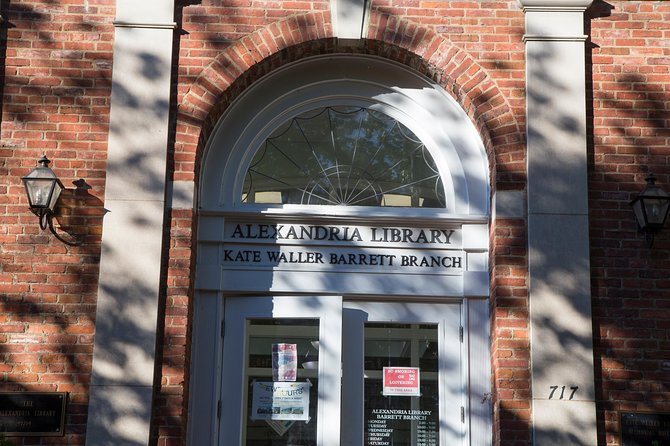
Drawing inspiration from their faith, many African-American residents of Alexandria actively engaged in civic and social justice movements throughout the city’s history. Religious institutions and churches played a vital role as hubs for community organizing and activism. Prominent Alexandria figures like Reverend William Whitehurst and Reverend Alsinus Rice used their pulpits to speak out against slavery and advocate for civil rights.
| Role of Religion in Activism | |
|---|---|
| Provided community spaces | Mobilized political action |
| Empowered moral leadership | Sustained long-term movements |
| Inspired hope and resilience |
This deep connection between faith and liberation shaped Alexandria’s African-American experience and legacy of social change.
Impact of Civil War Period
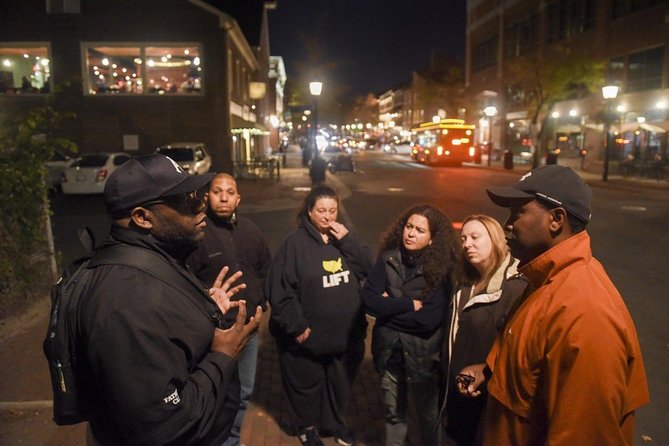
Against the backdrop of the Civil War that ravaged the nation, Alexandria’s African-American community experienced profound impacts that would reverberate for generations.
The conflict disrupted the status quo, leading to the emancipation of enslaved individuals and the emergence of new social and economic opportunities.
However, the transition was fraught with challenges, as the community grappled with the aftermath of slavery and the threat of persistent racism.
The Civil War era catalyzed a renewed sense of agency and activism, as African Americans in Alexandria mobilized to assert their rights and shape their own futures.
This pivotal period laid the groundwork for the ongoing fight for equality and justice that continues to this day.
Preserving Alexandria’s Black Heritage
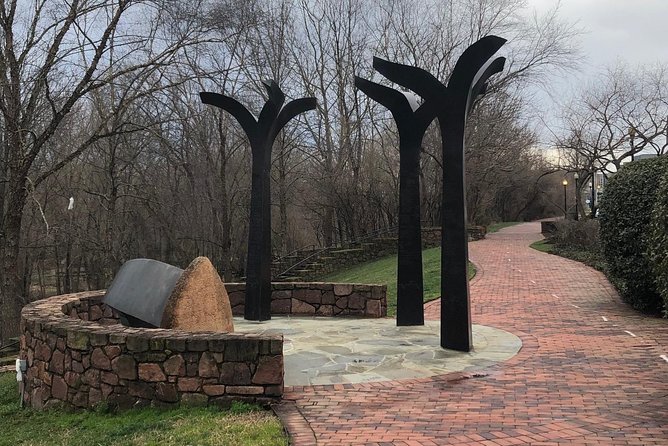
Though the Civil War’s impact had been profound, the African-American community in Alexandria remained steadfast in preserving its rich cultural heritage.
Passionate local historians and community organizations have worked tirelessly to document, protect, and share the stories of the city’s Black residents, ensuring their legacies endure for future generations.
The guided walking tour highlights key landmarks and figures, from the enslaved workers of Gadsby’s Tavern to the abolitionist heroes who fought for freedom. Visitors can enjoy Alexandria’s African-American history, gaining a deeper understanding of the resilience and contributions of this community.
Frequently Asked Questions
What Accessibility Options Are Available for Visitors With Disabilities?
The tour is wheelchair and stroller accessible, and service animals are allowed. It’s located near public transportation, making it accessible for visitors with disabilities. The tour accommodates a maximum of 30 travelers.
Can Participants Bring Their Own Food and Drinks on the Tour?
Yes, participants can bring their own food and drinks on the tour. The tour is outdoors, so visitors are welcome to pack a snack or beverage to enjoy during the 1.5-hour walking experience.
Is There an Option to Extend the Tour Duration if Requested?
Yes, the tour duration can be extended upon request. Participants can inquire with the tour guide about extending the tour, and additional fees may apply depending on the requested extension.
What Is the Policy for Traveling With Children on the Tour?
The tour accommodates families, and children are welcome. Strollers are allowed, and the tour route is wheelchair and stroller accessible. There’s a maximum group size of 30 travelers for an intimate experience.
Are There Any Discounts or Special Rates Available for the Tour?
The tour offers discounted rates for seniors, students, and children. Plus, there are combo packages available that include entry into the Historic Alexandria Museums. Visitors should inquire about these special offers when booking the tour.
Recap
Alexandria’s African-American community has a long and remarkable history of resistance against slavery.
From renowned abolitionists to historic sites, the city’s residents fought tirelessly to achieve freedom and equality.
The profound legacy of this struggle continues to shape the community’s identity and efforts to preserve its rich heritage, serving as a testament to the unwavering determination in the face of oppression.
More Tour Reviews in Virginia
- 4-Hour Fishing Skiff Boat Rental in Chincoteague Island, VA
- Cheeseology Un-brie-lievable Wine Pairings and Cheesy Wisdom!
- Smith Mountain Lake Weekly Ebike Rental With Delivery
- Self Guided Walking Tour in Alexandria Review
- 8-Hour Pontoon Boat Rental Review
- 2-Hour Sunset Skiff Boat Rental in Chincoteague Island, VA
Not for you? Here's more things to do in Virginia we have recnetly reviewed
- 9 Best Cruises And Boat Tours In Virginia
- 2 Best Food Tours In Virginia
- Arrival Private Transfer: Dulles Airport IAD to Washington in Luxury SUV
- Private Airport Transfer: Dulles Airport IAD to Washington in Luxury SUV
- Private Arrival Transfer: Dulles Airport to Washington DC (any Hotel or Address)
- Washington Dulles Airport (IAD) to Washington – Arrival Private Transfer
- Monday Art Party
- Private Horseback Experience in Appalachian Mountains
- Chincoteague Dolphin Watching Boat Tour
- 2-Hour Sunset Pontoon Boat Rental in Chincoteague Island, VA
- Kayak Rental on Shenandoah River in Luray Virginia
- Chincoteague E-bike Tours
